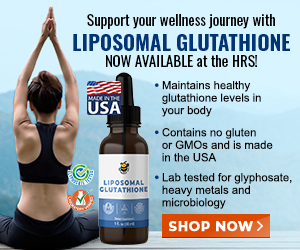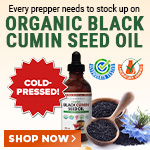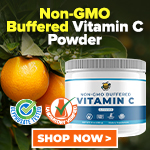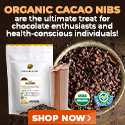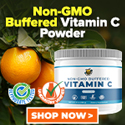Eating nuts daily reduces prostate cancer death rates by 33 percent
Thursday, June 23, 2016 by: Amy Goodrich
Tags: prostate cancer, nuts, prevention foods
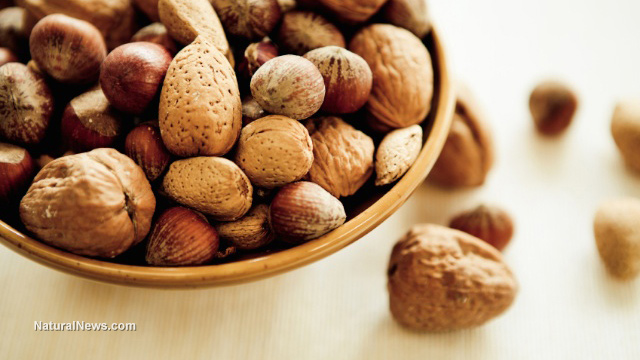
(NaturalNews) Men who have prostate cancer could significantly reduce their risk of death by regularly consuming nuts like peanuts, cashews, almonds, walnuts and hazelnuts, a new study has revealed.
Prostate cancer is the most commonly diagnosed form of cancer after skin cancer, and the second leading cause of cancer deaths in American men. In 2016, about 180,890 men will be diagnosed with prostate cancer in the U.S., and more than 26,000 men will die from the disease. According to the American Cancer Society, approximately one man in seven will be diagnosed with prostate cancer during his lifetime.
"Prostate cancer should be considered seriously as more men are prone to such diseases," said lead researcher Ying Bao from Brigham and Women's Hospital in Boston, United States.
Eating nuts can slash prostate cancer deaths by a third
Researchers from the Harvard Medical School in Boston studied 47,000 men over a 26 year period, and identified 6,800 individuals who developed non-metastatic prostate cancer. Of the men tested, 10 percent died from prostate cancer, while one-third died from cardiovascular diseases and other causes.The experts did not find any significant link between prostate cancer diagnosis and the regular consumption of tree nuts. However, they discovered that men who ate nuts five or more times a week after diagnosis had a 34 percent reduced risk of dying from prostate cancer compared to those who ate nuts less than once a month.
Most of the participants in the study ate peanuts, but according to the scientists, the protective benefits seem to apply to all types of nuts. Research suggests that tocopherol, a kind of vitamin E found in nuts, is responsible for the cancer-fighting properties.
Reporting their findings in the British Journal of Cancer, the researchers said: "No significant associations were observed between peanut or other nut consumption and prostate cancer incidence. But frequent nut consumption after diagnosis was associated with significantly reduced overall mortality. ...
"This suggests nuts, although not associated with being diagnosed with cancer, may still improve the overall survival of patients," they added.
Why nuts should be part of a healthy diet
Insulin sensitivity has been linked to the progression and risk of developing prostate cancer. Insulin resistance is a common condition in which cells become unresponsive to the hormone insulin, resulting in messed up blood sugar levels.According to the scientists, nuts may help to improve insulin sensitivity and decrease the risk of diabetes, cancer and heart diseases, thereby lowering the total mortality factor.
Also, tree nuts host a broad range of essential nutrients that provide anti-carcinogenic, anti-inflammatory, antioxidant and cardio-protective properties. These nutrients include proteins, unsaturated fats, vitamins, minerals and many other beneficial phytochemicals.
This study is not the first of its kind to suggest that regular consumption of nuts combined with a healthy lifestyle could help fight certain cancers and other life-threatening diseases. In a 2014 study, scientists found that a healthy diet and lifestyle, including frequently snacking on nuts, contributed to cancer suppression. Walnuts, in particular, slowed the growth of prostate, colon and renal cancers.
Maureen Ternus, who runs a nonprofit organization known as the International Tree Nut Council Nutrition Research & Education Foundation, said: "Just 1.5 ounces of nuts per day (about 1/3 cup) can have a positive impact on health."
"These findings add to the growing body of evidence showing that nuts should be part of a healthy diet," Ternus added.
Sources for this article include:
DailyMail.co.uk
Cancer.org
Food.NDTV.com
NCBI.NLM.NIH.gov
Hindawi.com
Prostate cancer at FETCH.news
Get independent news alerts on natural cures, food lab tests, cannabis medicine, science, robotics, drones, privacy and more.
Take Action: Support Natural News by linking to this article from your website
Permalink to this article:
Embed article link: (copy HTML code below):
Reprinting this article:
Non-commercial use OK, cite NaturalNews.com with clickable link.
Follow Natural News on Facebook, Twitter, Google Plus, and Pinterest
- Newly released JFK files reveal Pentagon's role in creating Lyme disease and covid in the same lab
- Trump's greatest betrayal so far: Accelerating Middle East wars, silencing dissent, and serving Zionist masters
- Trump nominates VACCINE ZEALOT Susan Monarez to lead the CDC, sidelining RFK Jr.'s reform efforts
- The hidden dangers in your kitchen: How cooking methods impact diabetes, cancer and aging
- STARDUST, a secretive Israeli-US startup, plans risky solar geoengineering experiment to BLOCK OUT THE SUN
- DEADLY DECEPTION: How COVID vaccines increased mortality rates and why authorities hid the truth
- Arkansas embraces medical freedom with landmark ivermectin law
- CDC finally halts $11 billion COVID funding scam as health officials admit the ‘pandemic’ was a fraud
- Lab leak confirmed? Boris Johnson's stunning reversal on COVID origins sparks global debate
- Home gardening for preppers: A beginner's guide to growing your own food
- Analysis: The coming economic collapse, a mass uprising and Trump's three secret weapons to halt the growing revolt
- The forgotten hormone hero: How vitamin C quietly balances mood, stress and reproductive health
- Festive flavors: The sweet history, nutritional profile and health benefits of pecan pie
- Elon Musk: Aliens could be here on Earth RIGHT NOW
- Dr. Mike Yeadon releases 15-minute testimony - WATCH - about genocidal intent of COVID “vaccines”
- Unraveling the paradox: Why intelligent individuals fall prey to everyday blunders
- YouTube’s double standard: CEO defends censorship while claiming free speech champion status
- California's social media censorship law struck down: A victory for free speech or a threat to online safety?
- Newly released JFK files reveal Pentagon's role in creating Lyme disease and covid in the same lab
- Elon Musk: Aliens could be here on Earth RIGHT NOW
- Reclaim your health: How midlife exercise reverses years of inactivity
- Trump reverses course on Gaza plan, says “nobody is expelling Palestinians”
- EPA advisor admits the agency is funneling billions to climate groups ahead of Trump’s return to White House
- Big Pharma's $8 Billion bribery scheme exposed: how doctors are pushed to prescribe junk science, not heal
- Space war brewing? Russia threatens to destroy Starlink satellites
- A lack of integrity in Academia: Harvard professor found GUILTY of fraudulent research to promote CRT theory
- Survival 101: Effective EMF blocking techniques
- Rep. Nancy Mace introduces bill to ban biological males from female facilities on federal property
- Mike Adams Sermon 66: God will DESTROY ISRAEL for its wickedness
- Pilots report mysterious lights 'moving at extreme speeds' across Oregon skies
- 5 Simple steps to boost your brainpower: How to strengthen executive function in a distracted world
- Historian warns Israel may be entering an “IRREMEDIABLE DECLINE”
- Florida takes a stand: DeSantis proposes permanent ban on mRNA vaccine mandates
- RFK Jr.'s SSRI antidepressant investigation sparks liberal meltdown, exposes Big Pharma's dangerous game
- OpenAI whistleblower who dissented against how the company trained ChatGPT found dead
- Sugarcane extract superior to cholesterol-lowering drugs?
- EPA advisor admits the agency is funneling billions to climate groups ahead of Trump’s return to White House
- The Health Ranger releases “Vaccine Zombie” song and music video, using AI-animated zombies for the music video
- California's social media censorship law struck down: A victory for free speech or a threat to online safety?
- Dr. Mike Yeadon releases 15-minute testimony - WATCH - about genocidal intent of COVID “vaccines”
- The pandemic as a tool for INDOCTRINATION: Understanding “The Indoctrinated Brain” by Dr. Michael Nehls
- Mike Adams releases country western hit single: Goin’ Back in Time is Comin’ Home
- Mike Adams releases music poetry sensation: A Child of God
- RFK Jr. clears key hurdle: Sen. Susan Collins backs controversial HHS nominee, signaling a new era for health policy
- Florida takes a stand: DeSantis proposes permanent ban on mRNA vaccine mandates
- Unpacking the Lies That We’ve Been Fed – new song and music video released by Mike Adams, the Health Ranger
- Mike Adams releases new song and music video: Nothing More Disgusting Than a Globalist
- Congratulations to the FULLY UNVACCINATED as you resisted the COVID-19 PROPAGANDA MACHINE fueled by over $100 BILLION
- “Why we influenced the 2020 elections”: Facebook files reveal the coordinated effort to bury the Hunter Biden laptop story
- Michigan sheriff announces criminal investigation into 2020 election crimes, Dominion Voting Systems
- Israeli soldiers accused of even more torture and abuse in the West Bank
- Migrants are taking advantage of recent hurricanes to scam residents and loot their homes
- House Intelligence Committee calls for the ARREST and PROSECUTION of Dr. Anthony Fauci
- Peter Rost exposes Big Pharma corruption in his book “The Whistleblower: Confessions of a Healthcare Hitman”
- Red Cross issues warning to stop blood plasma donations from vaccinated people
- Scientists confirm: GENIUS brain function can be spontaneously unleashed in humans without any apparent cause
- EPA advisor admits the agency is funneling billions to climate groups ahead of Trump’s return to White House
- HYSSOP: What research reveals about the health benefits of this ancient holy herb
- Two containers with completed ballots fall out of truck in Florida
- Fully vaccinated about to see “tsunami” of illness and death, warns virologist
- Global leaders unite to clamp down on “misinformation” with UN-backed Cascais Declaration
- BREAKING: 2025 NDAA authorizes mandatory military draft of WOMEN across America… as Pentagon pursues global NUCLEAR war with both Russia and China at the same time
- Michael Yon warns of a ZIONIST TAKEOVER in Trump’s second administration
- BOMBSHELL: DNA testing kits are a SCAM to develop ethnic-specific bioweapons
- Ozempic and Wegovy weight loss drugs are injectable LIZARD VENOM PEPTIDES that may unleash a devastating wave of organ failure… side effects align with symptoms of SNAKE BITES
- Israeli soldiers accused of even more torture and abuse in the West Bank
- These 13 countries just signed an agreement to engineer a global FAMINE by destroying food supply
- NASA admits that climate change occurs because of changes in Earth’s solar orbit, and NOT because of SUVs and fossil fuels
- RFK Jr. clears key hurdle: Sen. Susan Collins backs controversial HHS nominee, signaling a new era for health policy
- Sermon 30: How Jesus reveals Caesar’s FAKE CURRENCY and FALSE AUTHORITY
- Coriander seeds: Ancient medicine backed by modern science
- Arizona officials claim Maricopa County needs 10-13 days to tabulate results of the election
Science News & Studies
Medicine News and Information
Food News & Studies
Health News & Studies
Herbs News & Information
Pollution News & Studies
Cancer News & Studies
Climate News & Studies
Survival News & Information
Gear News & Information
News covering technology, stocks, hackers, and more



"Big Tech and mainstream media are constantly trying to silence the independent voices that dare to bring you the truth about toxic food ingredients, dangerous medications and the failed, fraudulent science of the profit-driven medical establishment.
Email is one of the best ways to make sure you stay informed, without the censorship of the tech giants (Google, Apple, Facebook, Twitter, YouTube, etc.). Stay informed and you'll even likely learn information that may help save your own life."
–The Health Ranger, Mike Adams










